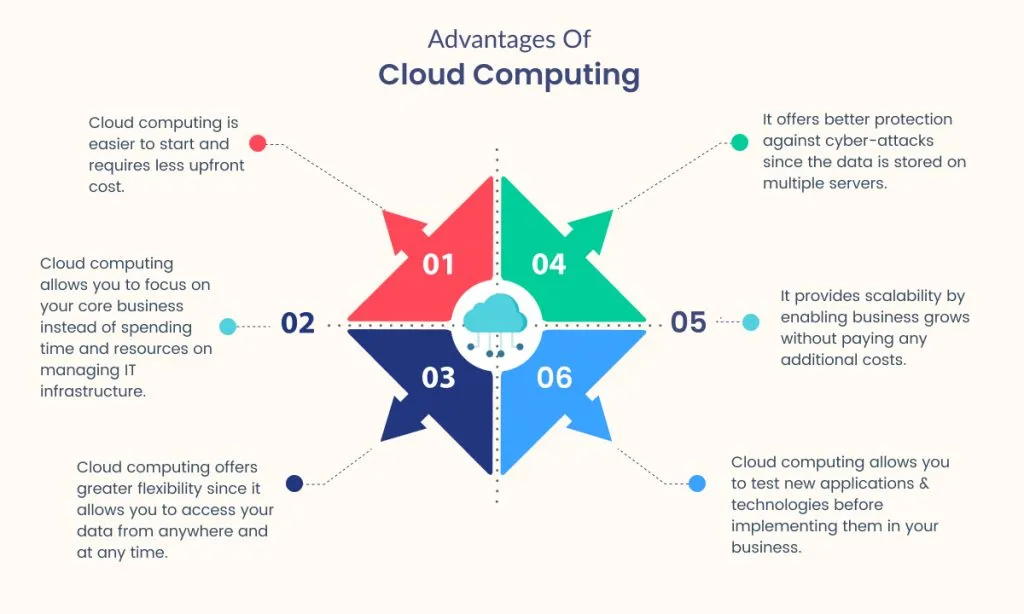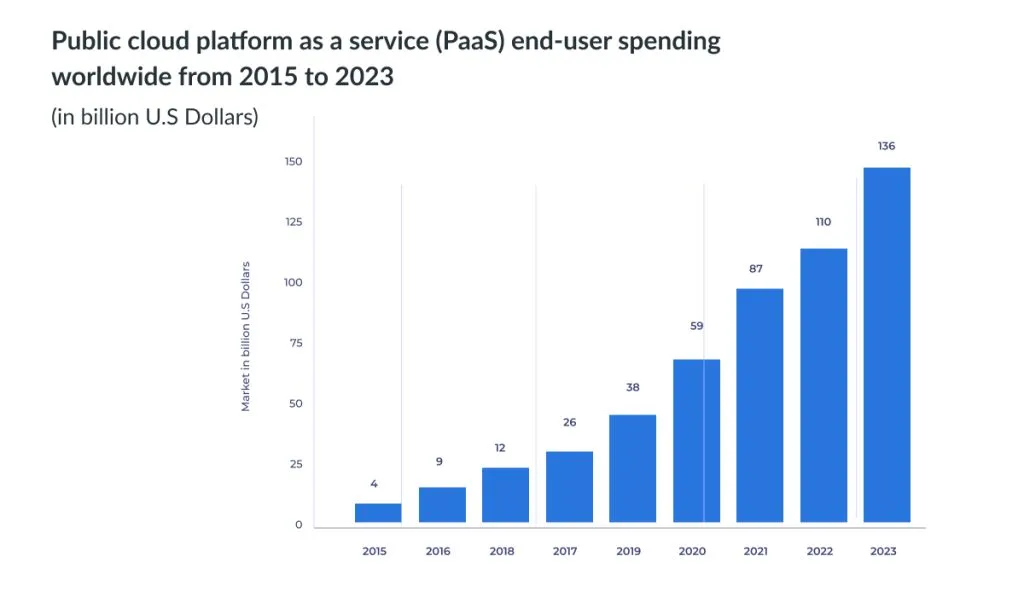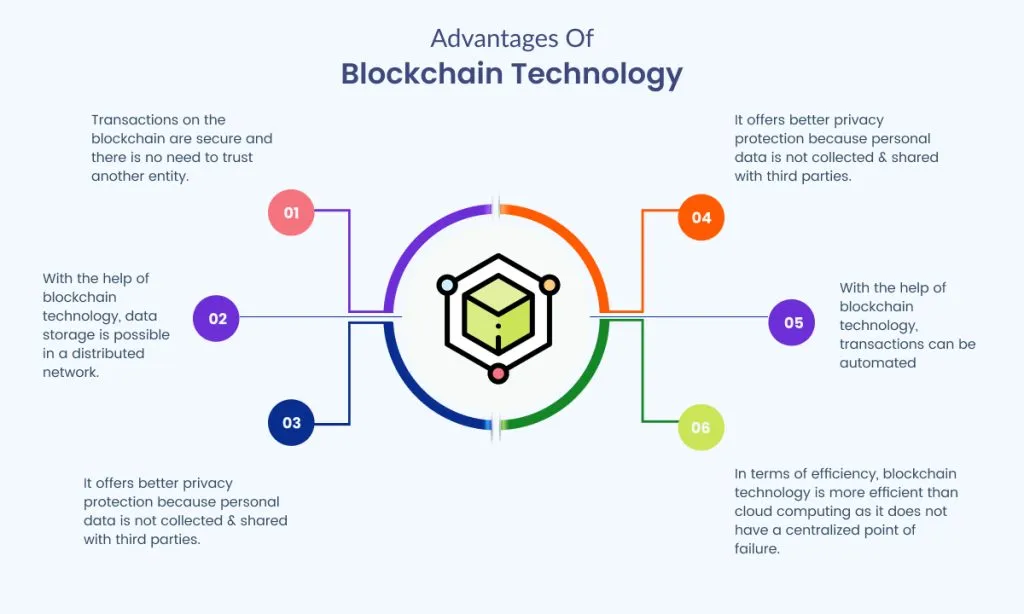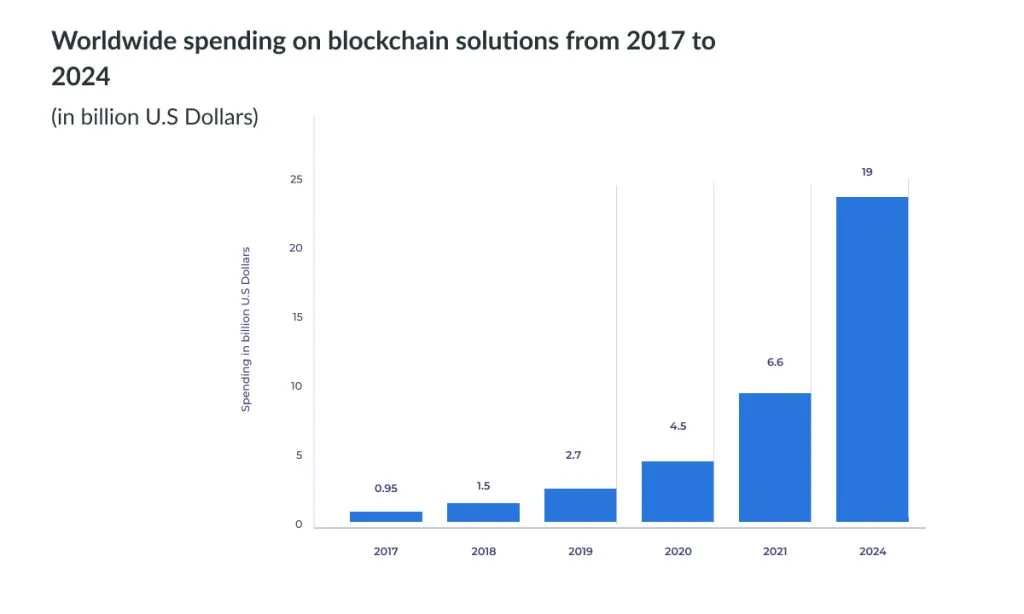Cloud Computing and Blockchain are two revolutionary technologies to help your business keep up with the times and increase your revenue. But how do you decide which of these two technologies is right for your business? Do you need them both?
Here’s what you should know about the differences between Blockchain Technology and Cloud Computing so that you can make an informed decision about how to proceed with implementing these game-changing technologies into your company’s operations.
What is Cloud Computing?
Cloud computing is a way of storing and accessing your information online. You don’t need to buy or maintain a server to store data because it’s all stored in the cloud. You can access the data from anywhere as long as you have an internet connection, making it easier to work remotely. With cloud computing, you don’t have to worry about backing up files because it automatically backs up everything and is available whenever you need it.
Cloud computing services come in two basic categories. The first type is known as Infrastructure-as-a-Service (IaaS), which provides virtualized resources like servers, storage space, and network capacity.
The other type is Platform-as-a-Service (PaaS), which provides development tools, programming languages, and operating systems that developers use when creating applications. A common choice among AI Development Company founders looking to get started with AI is PaaS providers like Amazon Web Services that offer AI tools like TensorFlow.
Also Read: Top Cloud Computing Trends That Will Shape Businesses In The Coming Years
Distinctive Features Of Blockchain & Cloud Computing
Cloud computing and blockchain technology might look the same. However, they differ from each other. Let’s have a look at their distinctive features:
| Sr. No. | Cloud Computing | Blockchain Technology |
| 1 | Cloud computing can be considered an internet-based hosting service where providers offer storage space & computer power over the internet. | A blockchain is a decentralized ledger that maintains a continuously growing list of data records secured from tampering and revision. |
| 2 | With Cloud computing, you can store your information in one centralized location. | With blockchain technology, you can store data in multiple locations worldwide, with every node storing a copy of it. |
| 3 | As opposed to blockchain’s peer-to-peer design, cloud computing heavily relies on having many intermediary companies. | Blockchain doesn’t require any third-party service providers to function, and anyone can control everything within its network |
| 4 | It offers greater versatility, as you can access your files from different devices. | Blockchain is restricted to certain protocols. |
| 5 | Data is mutable | Data is immutable |
Advantages of Cloud Computing
Cloud computing offers several advantages that can’t be ignored. Here are some advantages of cloud computing:
- Cloud computing requires less upfront cost and is easier to start.
- You don’t need to worry about software upgrades or hardware maintenance with cloud computing.
- Cloud computing offers better protection against cyber-attacks since it stores the data on multiple servers in different geographical locations.
- Cloud computing allows you to focus on your core business instead of spending time and resources managing IT infrastructure.
- Cloud computing provides scalability, which means you can start small and scale up as your business grows paying no additional costs.
- Cloud computing offers greater flexibility since it allows you to access your data from anywhere.
- Cloud computing allows you to test new applications and technologies before implementing them in your business.
Disadvantages Of Cloud Computing
Although Cloud Computing has many advantages, there are also a few disadvantages you should know. Some disadvantages include
- Centralized Data Storage – Cloud computing stores all your data in one central location, making it vulnerable to being hacked or tampered with.
- Physical Hardware Failure – With physical hardware failures such as power outages or server crashes, you can lose access to your data, resulting in high business downtime and an interruption in productivity.
- Lack of Security – Cloud computing systems are more vulnerable to attack due to their centralized nature.
- Cost-Efficiency– When it comes to cost-efficiency, cloud computing is typically much more expensive than implementing a blockchain solution at the enterprise level.
- Single Point of Failure – Due to cloud computing being centralized and in one location, your business would be affected worldwide if there were an outage.
Also Read: – Cloud Computing Trends to Watch Out for in 2025
Real-World Applications For Cloud Services
Cloud computing is a popular option because it allows storing data anywhere and in any format. In contrast, blockchain technology only stores data in one location. This means that if there were a virus or natural disaster near your office, all of your important files would not be lost. Here are five real-world cloud service applications:
- Dropbox: With over 300 million users, Dropbox has revolutionized the way we store information on the internet. It provides an easy way to access your documents from any device without losing any formatting when sharing with others. It also offers automatic backup as soon as you save a file so that even if your computer crashes, everything will still be saved and accessible.
- Google Apps: Another useful cloud storage application is Google apps. It gives you 15 gigabytes of free storage, which can be upgraded by paying monthly fees ranging from $1-$10 per month, depending on the size. You can easily organize files into folders and sub-folders by color coding them with Google Drive’s labeling system, making it easier to find what you’re looking for.
- SlideRocket: SlideRocket is another excellent app for small business presentations. You can upload your PowerPoint presentation, edit it online and then download the finished product without ever having to use PowerPoint again! Best of all, they offer several pricing packages to fit your needs – starting at just $3/month.
- IBM Cloud: IBM’s cloud services offer several great options to meet different businesses’ needs. For example, IBM Bluemix combines Watson’s artificial intelligence with infrastructure as a service (IaaS), while IBM SoftLayer delivers bare metal servers, virtual machines, and virtual desktops on demand. Their website has many more unique offerings, so look around and see what works best for you!
- Big Data Analysis: Next real-time case is Airbnb. Airbnb’s mission statement is to create a world where people can belong anywhere. They want everyone to experience new cultures and places, no matter their budget. They accomplish this by renting out rooms and houses instead of hotels, allowing guests to interact with locals and learn about the culture of their destination while spending less money than they would otherwise.
Discover the power of Cloud Computing and Blockchain Technology: Find the perfect fit for your business!
Prospects For Corporate Cloud Computing
In 2023, the platform as a service (PaaS) market is estimated to be worth approximately 136 billion U.S. dollars. PaaS is a type of cloud computing offered by service providers to customers. PaaS is a complete development and deployment environment in the cloud.
AI Development Company has developed a cloud computing platform that integrates AI and machine learning in the corporate environment. The platform offers reduced costs, increased data security and reliability, and improved customer satisfaction. Corporate cloud computing has evolved to provide AI development companies with many advantages. Increased security and reliability of data provide AI developers with peace of mind while improving customer satisfaction.
Reduced costs will allow these companies to reinvest their savings back into the company to grow faster than ever before. AI development companies are cutting the edge of what it means to be an AI developer. Cloud computing provides them with many benefits, which have helped propel their growth further!
Also Read: Cloud Computing in Manufacturing: Solutions to Stay on Top
What Is Blockchain Technology?
Blockchain Technology, also known as Distributed Ledger Technology (DLT), is a newer way of storing and sharing data. The data stored on a blockchain consists of blocks containing a timestamp and other information. It’s not just one central database that stores all the information, so there’s no single point of failure. This makes the blockchain extremely secure and difficult to hack.
The technology can eliminate the need for middlemen in many transactions. If a buyer and seller don’t trust each other, they can send money to an escrow account at their respective banks. With blockchain, you can transfer money directly without going through an intermediary like PayPal or Venmo. To explore business possibilities, enterprises often hire Blockchain Development Company to have a better understanding.
Also Read: How Has Blockchain Evolved FinTech For 2025?
Advantages Of Blockchain Technology
Blockchain technology has many advantages that make it a good choice, such as:
- Transactions on the blockchain are secure, and there is no need to trust another entity.
- With the help of blockchain technology, data storage is possible in a distributed network, so it’s difficult to change the info.
- It offers better privacy protection because personal data is not collected & shared with third parties.
- Many AI development companies use blockchain technology to create decentralized apps for blockchain development.
- Blockchain technology can help you store records in a distributed system, making tamper with information harder.
- We can integrate blockchain technology into smart contracts, making them self-executing when certain conditions are met.
- In terms of efficiency, blockchain technology is more efficient than cloud computing as it does not have a centralized point of failure.
- With the help of blockchain technology, we can automate transactions.
Also Read: Top Blockchain Development Companies To Improve Your Business Efficiency
Disadvantages Of Blockchain Technology
- Lack of enough users: If there are not enough people using the system, then the value of the token decreases. The result would be that blockchain technology becomes less appealing to businesses.
- Complex technology: The processing power required for running blockchains at scale is more than a typical server can handle. The blockchain ledger has to be replicated on every node, which increases that workload.
- Time-consuming tech: Blockchains work slowly. Bitcoin, a public blockchain platform popular in its own right, takes an average of 10 minutes to record each transaction on its network. Because blockchains are decentralized, any one person or group of people can not alter them.
- Low user base: Low user adoption will affect a platform’s trust and safety. For example, if users feel that another company can use data provided to one company, they might not be inclined to provide it. Similarly, they won’t use any platform if they are concerned that their information isn’t secure.
- Lack of interoperability. This connects to a low user base because for blockchain platforms to be interoperable, users need to be on many different platforms.
Real-World Uses Of Blockchain
As a globally operating AI Development Company; we’ve noticed the rise in using blockchain technology and its impacts on various industries. This allows businesses to explore and see if it’s right for them. There are many ways that blockchain technology has improved or changed certain aspects of life and work in various industries, such as banking, healthcare, supply chain management, energy, education, retail, and more. Here are five real-world blockchain applications that are in trend:
- HealthCare: Blockchain in health care is a multi-billion dollar industry, and every major organization has a relationship with it. From hospitals to insurance companies, doctors, patients, and patients’ relatives, almost everyone involved with the healthcare system uses blockchain technology. This technology provides cost-effective solutions for all parties involved in healthcare, including patients. Its transparency means multiple stakeholders can easily access and review their data in real-time via their mobile devices.
- Supply Chain Management: More than $1 trillion worth of goods passes through customs clearance annually. A complex network connecting shippers, carriers, and forwarders is needed to complete these transactions from end to end. It can be hard for any entity within this network to maintain an accurate product information record because different players have separate records on disparate systems without reconciling any inconsistencies between them.
- Energy: Blockchain technology will make renewable power sources more efficient by allowing communities to trade green power peer-to-peer without an intermediary utility. Individuals can produce excess electricity and sell it back into the grid when they need extra money, providing sustainable electricity prices and driving down costs.Additionally, people will be able to generate their own solar power at home, then share that solar power directly with nearby consumers without being subject to local restrictions on trading residential solar power in other places.
- Retail: With Walmart’s partnership with IBM Food Trust, customers are gaining insight into where their food came from and how fresh it is. The trust gives customers access to data like farm origination details, transportation conditions, storage temperature levels, and spoilage. Transparency is key when shopping for food.
- Education: Schools can leverage blockchain technology for certificates of achievement to ensure that student diplomas cannot be faked or duplicated. Teachers can also use blockchain to verify school transcripts or transfer credits across schools. This technology can help schools improve efficiency and reduce fraud while maintaining rigorous standards.
Also Read: IoT in Healthcare: Benefits, Challenges and Applications
Prospects of Blockchain Technology
In 2021, global spending on blockchain solutions is projected to reach 6.6 billion dollars. Forecasts suggest that spending on blockchain solutions will continue to grow in the coming years, reaching almost 19 billion U.S. dollars by 2024.
Blockchain technology has been hailed as the next big thing in the tech world. By understanding how blockchain works and how to use it effectively, you can make informed decisions about whether this innovative tech should be integrated into your business. Blockchain technology enables businesses to develop AI applications independently, without relying on large companies like Google and Facebook.
AI Development Companies are currently exploring prospects of blockchain in diverse sectors. Blockchain-based AI application development will provide the specific needs for a variety of sectors, such as health care, finance, agriculture, etc. The ability to control data access and security will be important considerations for all industries, including AI developers.
Discover the power of Cloud Computing and Blockchain Technology: Find the perfect fit for your business!
Business Benefits
Blockchain technology has a lot of benefits when it comes to processing transactions and data. Cloud computing allows you to access your data and programs from any device as long as they have an internet connection. Let us understand the business benefits of both technologies:
| Sr. No. | Cloud Computing | Blockchain Technology |
| 1 | Cloud computing is a great way for small business owners to scale their companies with very little capital. | Blockchain technology enables startups to implement AI tools more easily, since it provides an infrastructure that supports automation. |
| 2 | It can also be beneficial for individuals who are interested in starting a side hustle. | The technology gives businesses access to a new range of emerging technologies, skills, & networks. |
| 3 | As it eliminates hardware investments and requires only monthly payments, you don’t have to wait long periods before you see a return on your investment. | Businesses can use blockchain-based platforms for easier development & management of products, services, IoT devices, or bots. |
| 4 | Many platforms offer easy-to-use graphical interfaces that make the platform seems almost like second nature. | Many businesses use blockchain technology to track deliveries in real-time and maintain security when conducting transactions. |
| 5 | Cloud computing is a compelling resources when considering how it can increase efficiency in both large and small businesses. | Blockchain technology can help companies develop their own AI Development Company without relying on any centralized servers. |
Conclusion
So, what’s the best option for your business? That’s hard to say. Both Cloud Computing and Blockchain Technology have their pros and cons. Ultimately, the choice will come down to how much you will invest in either one and where you see your business going in the future. What should you do now? Why not Hire Blockchain Developers or an AI Development Company if you need a hand with this? They’ll be able to offer expert advice on what would suit your needs best.









